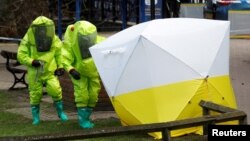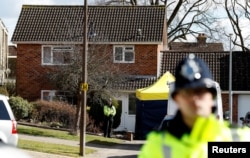British Prime Minister Theresa May is promising an "appropriate" response if it is discovered that Russia is responsible for poisoning a former Russian spy and his daughter.
"But let's give the police the time and space to actually conduct their investigation," she told ITV news Thursday. "Of course, if action needs to be taken, then the government ... will do that properly at the right time and on the basis of the best evidence."
Home Secretary Amber Rudd told Parliament "the use of a nerve agent on British soil is a brazen and reckless act. This was attempted murder in the most cruel and public way."
A police official told Britain's Sky News a total of 21 people were injured by the nerve agent released near a shopping center in the southern city of Salisbury.
Three people are still in the hospital — the apparent intended target, former Russian spy Sergei Skripal; his daughter, Yulia; and British policeman Nick Bailey, who came to their aid after he found the two slumped unconscious on an outdoor bench.
An eyewitness told British reporters Yulia Skripal was passed out, frothing at the mouth with her eyes "wide open, but completely white." He said, "the man went stiff, his arms stopped moving, but he was still looking dead straight."
Skripal and his daughter were still unconscious and in critical condition as of late Thursday. Bailey was in serious condition, but awake.
Police have been examining security camera footage of the crime scene and are reportedly focusing their attention on a man and woman spotted nearby.
Police have not publicly talked about the nerve agent that poisoned Skripal or who might have been responsible.
But suspicions are pointing to Russia.
Skripal served in Russia's military intelligence agency, GRU. He was exchanged in a Cold War-type spy swap in 2010 on the runway at Vienna's airport.
After serving four years in prison in Russia for spying for Britain's espionage service, MI6, Skripal was one of four Russian double agents exchanged for 10 Russians expelled from the United States, including Manhattan socialite Anna Chapman.
The incident is drawing comparisons to the case of Alexander Litvinenko, a Russian KGB officer-turned-British intelligence agent and a highly public critic of President Vladimir Putin.
Litvinenko died an agonizing death days after drinking tea laced with radioactive polonium-210 in a London hotel in 2006. British doctors struggled in that case to identify the substance that killed him.
A British inquiry concluded Putin probably approved the killing. The conclusion was angrily dismissed by the Kremlin as a politically motivated smear.
Russia is also denying any involvement in the Skripal poisoning.






